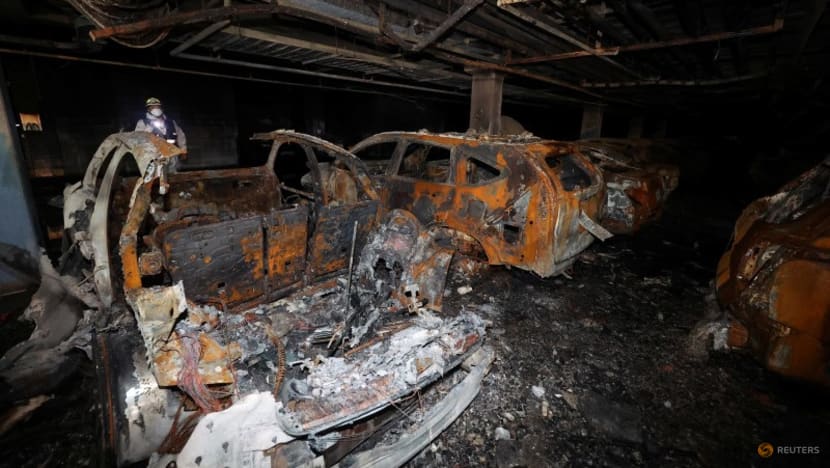South Korean drivers scramble to get rid of electric vehicles, citing safety concerns following fires
There are more than half a million EVs in South Korea, accounting for about 2 per cent of registered vehicles

Vehicles that were completely burned down due to a Mercedes Benz electric car fire that broke out on Aug 1, are lying in the underground parking lot of an apartment complex in Incheon, South Korea on Aug 2, 2024. (File photo: REUTERS/Yonhap)

This audio is generated by an AI tool.
SEOUL: South Korean taxi driver Park Jeong-soon bought his electric vehicle (EV) about four months ago as he wanted to spend less on fuel.
The switch has had the intended effect – he now pays around 400,000 won (US$299) per month – about a third of what he used to fork out for his previous car powered by diesel.
While he is happy with the savings, recent incidents of EV fires are putting him on edge.
"In my apartment, I charge my car fully in the underground parking lot, and that makes me nervous,” he told CNA.
On Aug 1, a Mercedes-Benz electric sedan with batteries made by Chinese company Farasis Energy caught fire in the underground garage of an apartment in the South Korean city of Incheon.
The blaze took over eight hours to extinguish and reportedly damaged more than 100 cars. More than 20 people also suffered smoke inhalation and had to be hospitalised.
Preliminary investigations show that the fire was made worse because the sprinklers in the parking lot did not work properly.
Just days later, a Kia EV6 burned out in a parking tower in South Chungcheong province, taking more than an hour to put out.
In a report published in February, the Seoul Metropolitan Fire & Disaster Headquarters said 1,399 fires occurred in underground parking lots in South Korea between 2013 and 2022 with 43.7 per cent attributed to vehicles.
It said electrical sources accounted for more than half of car fires in underground garages.
EV ADOPTION IN SOUTH KOREA
Currently, about 14 per cent of the 240,000 registered taxis across South Korea are EVs.
They are among more than half a million EVs in the country, which account for about 2 per cent of registered vehicles.
However, safety concerns are now hurting South Korea's EV market.
Used-car dealer Song Su-chan said more EV owners are trying to sell their cars but there are few takers.
"We have (EVs) being put on the market, but we can’t accommodate them because they’re just not selling. We need to be able to sell one to buy another,” said Mr Song, who has 45 years of experience in the trade.
“Even if the prices drop, the deals are not happening. We used to sell a few units a day, but now, not even one or two,”
Other dealers at Seoul’s largest used-car market Jang-an-dong had similar stories to tell.
According to used-car trading platform K Car, listings from motorists wanting to sell EVs rose 184 per cent in the first week of August from a week before.
One dealer for second-hand Mercedes Benz EVs said while he has received enquiries from potential buyers, most of them just wanted to know if prices will fall further.
Related:
FEARS OVER EVs
Experts said the massive damage after the recent Mercedes Benz EV fire has changed people's perspectives on EVs.
It was the first time such a large-scale incident took place, noted automotive and transportation design academic Kwon Yong-joo.
“Before, if one or two cars caught fire, people were somewhat able to accept it. But when one vehicle causes damage to 160 cars … that’s a huge shock. This leads people to think: ‘Should I really keep driving an electric vehicle?”” said the adjunct professor from Kookmin University.
Because of such fires, EVs are now banned from some places like underground apartment parking lots, hospitals and even public parking spaces in downtown Seoul.
Professor Kwon believes the negative sentiments will cool down, especially since the government is putting in place new measures, including urging carmakers to reveal what batteries they use.
Still, other observers said more needs to be done, given that EVs are here to stay. The government also needs to enforce strict regulations to make sure safety measures like sprinklers are in place, they added.

















